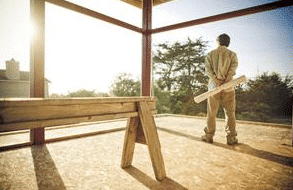How to Choose a Contractor for your Strawbale Building
Our intention at Strawbale.com is to empower and educate people like you with the skills necessary to undertake a straw bale construction project on your own.
However, if you don’t want to do, let’s say, your own plumbing or wiring, or if local code prevents you from doing those without a license, it will be necessary for you to hire a contractor or sub.
The task of finding a contractor can be a daunting one. Everyone has heard of a nightmare contractor/client story, and the stakes are usually very high.
After all, most of the time, it is someone’s home that is on the line. The majority of complaints revolve around poor workmanship and failure to complete the job. But for every frightening story out there, there are hundreds of successful ones. A little work and preparation go a long way in making the choice and the final results pleasant.
If you come across a sub or general contractor who is insecure about working with straw bales, share our website with them or even gift them access to one of our learning courses or workshops. We have had a number of community members who did that with their builders or sub-contractors with great success.
It may be helpful to go to your first meeting with some books or printed material about straw bale construction. A little bit of reassurance may be all that you need to provide. Usually, they want to know the details of how it all goes together, which is pretty reasonable!
Here are some helpful tips to guide you down the road to your building project success.
Word of mouth
This may be your most powerful tool in finding a reputable, professional, and skilled general contractor or subcontractor. Make a serious effort to broadcast that you are looking for a skilled tradesman. Happy homeowners are often the best source of leads.
Ask at local real estate offices and smaller lumberyards
These are great resources. They often have their fingers on the pulse of who is doing good, honest work in your area and, most importantly, whom you should avoid like the plague.
References
Once you find at least three contractors that potentially fit your needs, ask for references, and don’t be shy about calling them. This is a good time to ask specific questions, such as about the quality of workmanship, timeliness in communication, honesty level, and general mood throughout the project. Any good contractor with nothing to hide will gladly provide you with 3-4 references. This is standard procedure, and they anticipate this step.
Site visit
Ask contractors if you would be welcome to visit any current projects they are involved in. When there, use this as an opportunity to look for things such as tidiness and general crew mood. Ask if you can talk to the current client and ask for their honest feedback about their contractor.
Choosing based on bids
There is a general recommendation when picking a contractor that states that one should choose the middle bidder out of three. However, don’t be afraid to choose the highest bidder if you feel confident that they will provide you with a superior result over the other two. If cash is tight for you, it may especially be tempting to choose the least expensive bid. Beware that the money saved up front may be nice but that the headaches, stress, and lack of quality work may not be worth the initial savings.
License and Regulation
Be sure to determine if your state or local jurisdiction requires contractors to be licensed and regulated. In areas that offer no regulations for contractors, we recommend that you follow the “three-year rule” and only hire professionals that have been in business for at least that amount of time under that business name. This can prevent you from hiring someone who has recently changed their business name to sidestep a bad reputation at his/her heels.
Communication!!!!
This is crucial. Make sure that you feel confident in your prospective contractor’s ability to communicate and problem-solve since issues do come up in any building process. Spend some time conversing with the person and notice how you feel when you are with them. Is there a sense of ease and calm or do you feel tense, rushed, and intimidated to ask questions? You will likely be able to determine a lot about their ability to communicate within the first one or two meetings.
Workman’s comp
Be sure to check that the contractor has the required workman’s comp (if he/she has a crew), property damage, and liability damage insurance. If not, the bill could be on you if he/she falls off their ladder on their way up to build your roof.
These are the guidelines that we suggest using to find professional, reliable, and skilled subcontractors. The attention that you put into the selection process should lead you to a worthy payoff in the end.
Conclusion
There are plenty of quality sub-contractors out there who are craftspeople at their trades. Go slow to go fast, and take the time to use the tips above to find a great fit for your project.
If you have more questions or have an eager-to-learn-strawbale Contractor who has questions, feel free to include them on a consultation. Timbo can bridge the knowledge gap and help a contractor feel confident in taking on a new-to-them type of construction.

